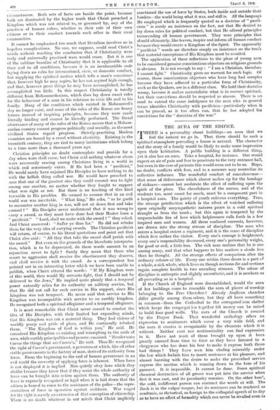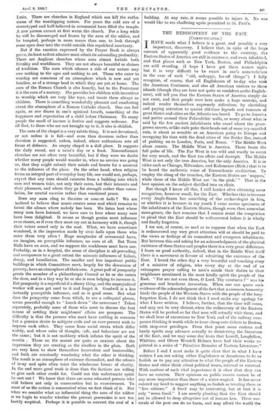THE AURA OF THE EDIFICE.
THERE is a personality about buildings—an aura that WO feel the instant we go in. That there should be such a spiritual atmosphere pervading a house is natural. The character and tho story of a family would be likely to make some impression upon their habitation. A public building is a different thing, yet it also has an aura. Take a hospital, for instance. One would expect an air of pain and fear to penetrate to the very entrance hall, but even in the case of patients this would seem not to be so. Hope, no doubt, conflicts with fear, and in a measure may neutralize ite collective influence. The wonderful comfort of convalescence— that sense of deliverance which almost makes up for the bondage of sickness—cannot but moderate the effect of suffering upon the spirit of the place. The cheerfulness of the nurses, and of the students too, must count for much, must be a component part in a hospital aura. The gaiety of youth enlivens everything. True, the strange petrifaction which is the effect of watched suffering upon originally unsympathetic natures pours in a cold spiritual draught as from the tomb ; but this again is tempered by the unquenchable fire of love which helplessness calls forth in a few inspired men and women. All these confused currents, however, are drawn into the strong stream of discipline. The man who enters a hospital enters a regiment, and it is the sense of discipline which first strikes the visitor. Every one's courage is heightened, every one's responsibility decreased, every one's personality weighs, for good or evil, a little less. The sick man realizes that he is one among many, and that what happens to him matters a shade leas than he thought. All the strange effects of comparison alter the ordinary colours of life. Every one within those doors is a part ef a whole, a sick whole, which lives on though sections die and sections regain complete health in two unending streams. The odour of discipline is antiseptic and slightly anaesthetic, and it is nowhere so all-pervading as in a hospital.
If the Church of England were disestablished, would the aura of her buildings come to resemble the aura of places of worship belonging to the Free Churches ? Already Anglican churches differ greatly among them selves, but they all have something in common—from the Cathedral to the corrugated-iron shelter which keeps the congregat icn tcgether till money can be raised to build four good walls. The aura of the Church is created by the Prayer Book. That wonderful anthology offers an expression to sentiments which cover a very wide field, and the aura it creates is recognizable by the elements which it is without. Neither cant nor sentimentality can find expression in it. Have not most of those brought up upon it been greatly amused from time to time as they have listened to a clergyman who has done his best to make it express both those bad things ? They have seen him chafing miserably under the law which forbids him to insert sentences at his pleasure, and almost bursting with the desire to make the prescribed service express the unction which is running down to the hem of his garment. It is impossible. It cannot be done. Some spiritual chemical destructive of all grease was put into the service when first it was cast, and its peculiarity remains. On the other hand, the cold, indifferent parson can contract the words at will. The Book is in the vulgar tongue, but its sentences can be rendered so academic, so rhetorical, so foreign to the colloquial speech of to-day as to have an effect of formality which can never be rivalled even in
Latin. There are churches in England which can kill the enthu- siasm of the worshipping nature. For years the cold airs of a stereotyped and half-believed-in ceremonial have filled the temple. A new parson cannot at first warm the church. For a long while he will be discouraged and frozen by the aura of the edifice, and be tempted, perhaps in more senses than one, to look through some open door into the world outside this sepulchral sanctuary.
But if the emotion expressed by the Prayer Book is always grave, its least ardent admirer must admit its astounding profundity. There are Anglican churches whose aura almost forbids both frivolity and worldliness. They are not always beautiful or shrines of tradition. The aura which silences a side of our nature may owe nothing to the ages and nothing to art. Those who enter to worship are conscious of an atmosphere which is new and yet familiar, as of a strange land in which they are yet at home. The aura of the Roman Church is also homely, but to the Protestant it is the aura of a nursery. She provides her children with incentives to worship which am very like toys, and treats them always as children. There is something wonderfully pleasant and comforting about the atmosphere of a Roman Catholic church. One can feel again, as one draws in one's spiritual breath, something of the happiness and expectation of a child before Christmas. To many people the smell of incense is festive and suggests welcome. For all that, to those who are not brought up to it, it also is childish.
The aura of the chapel is a very subtle thing. It is not devotional, or not unless it is full—and even then decorum rather than devotion is suggested, unless, indeed, where enthusiasm sets all forms at defiance. An empty chapel is a dull place. It suggests the daily round, not a saint's day or a feast. Nonconformist churches are not often very beautiful, but if they were we doubt whether many people would wander in, when no service was going on, that they might submit their minds and hearts for a moment to the influence of the place. On the other hand, when religion forms an integral part of everyday busy life, one would not, perhaps, expect that any aura should emanate from a building into which men and women take, not only their cares, but their interests and their pleasures, and where they go for strength rather than conso- lation, for mental exercise rather than emotional peace.
Does any aura cling to theatres or cone:at halls ? We are inclined to believe that music creates some soul which remains to haunt the silence where melody has been We listen best where many men have listened, we have ears to hear where many ears have been delighted. It seems as though genius must influence even stones, as if even they must cry out in harmony with it, though their voices sound only in the soul. What, we have sometimes wondered, is the impression made by civic halls upon those who enter them very often ? Huge receptacles of ceremonial have, we imagine, no perceptible influence, no aura at all. But Town Halls have an aura, and we suppose the workhouse must have one. Probably, as in a hospital, the sense of discipline is all-pervading, and overpowers to a great extent the miasmic influences of failure, decay, and humiliation. The smaller and less important public buildings in which Committees meet, largely for the discussion of poverty, have an atmosphere all their own. A great puff of pomposity greets the member of a philanthropic Council as he or she enters the door, and in a tiny way he or she is soon helping to increase it. But pomposity is a superficial if a showy thing, and the unprejudiced worker will soon get used to it and forget it. Goodwill is a less instantly perceptible influence, and so is good sense. But what does the pomposity come from which, to use a colloquial phrase, seems powerful enough to "knock down" the newcomer ? Taken separately, probably none of these who meet to discuss the best means of settling their neighbours' affairs are pompous The difficulty is that the persons who meet have nothing in common Lut a genuine desire to mitigate evils and an ever-present wish to impress each other. They come from social strata which differ widely, and where rules of thought, talk, and behaviour are not the came ; but it is not snobbery which inflates the spirit of the ineetin . Those on the mount are quite as anxious about the impression they are creating as the dwellers in the plain. Both are very keen to show themselves benevolent and businesslike, and both are constantly wondering what the other is thinking.
The result is an atmosphere of extreme discomfort, and the odours of ircny and spite often taint the wholesome breeze of charity.
In the end more good work is done than the factions are willing to give each other credit for. Could not this unfortunate spirit be cast out ? We know that there are some educated persons who still believe not only in consecration but in exorcisement. To most of us the notion is nonsensical when we first think of it. But when we consider what an influential thing the aura of the edifice is we begin to wonder whether the present generation is not too hastily sceptical. Perhaps it is possible to convert the soul of a building. At any rate, it seems possible to injure it. No one would like to see chaffering again permitted in St. Paul's.



































 Previous page
Previous page